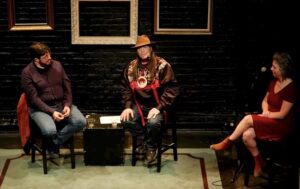Curve Lake storyteller keeps culture alive at storytelling festival

By Rick Garrick
TORONTO — Curve Lake storyteller Mike Ormsby and Iranian-Dutch storyteller Sahand Sahebdivani highlighted the importance of storytelling during their Keeping Culture Alive discussion on May 10 at the Toronto International Storytelling Festival.
“I’m half [Anishinabek] and half Irish — which is really unique because I come from two oral traditions, both the Irish and the Anishinabek are storytellers,” Ormsby says. “The Irish and the Anishinabek both went through a lot of things dealing with this wonderful thing called colonization. In my situation I didn’t know I was Anishinabek until I was 17-years-old.”
Ormsby says his grandmother, whom he was very close to, was sent to one of the Spanish Indian Residential Schools when she was six-years-old and was gone for 12 years.
“To know where you’re going you have to know where you came from, and I had to find out about my family,” Ormsby says. “Most of the stories that I share as an Anishinabek storyteller are stories I was taught, and there are usually teachings involved in those. But some of the stories I share are either personal stories like my own history or stories about our people. We have lots of different stories.”
Ormsby says he learned about his culture and his traditions through learning stories, whether it was oral stories, songs, rock paintings, or bark scrolls.
“Those old stories are as new today as they were when they were first told, those teachings are as new today as they were when they were first told because they have not lost their meaning,” Ormsby says.
Ormsby says the young people are asking for those teachings and those stories.
“Some stories I can share and some I can’t,” Ormsby says. “You have to understand that for a long time as a people, we weren’t allowed to even talk about these things, we weren’t allowed to share those things, we weren’t allowed to practice our traditions, our beliefs. It was outlawed — people would end up in jail for it.”
Sahebdivani says although he is connected to an ancient tradition of stories that are thousands of years old, he also learned stories from his family.
“I have been able to listen to my dad telling me stories about how he had fallen in love with my mom,” Sahebdivani says. “And how the parents of my mom had met and how the parents of my dad had met and what that meant, and what it was like to be in prison for four years and the woman that you’ve married comes once a month to visit and what it means to have to flee.”
Sahebdivani says a group of youth he worked with in the Netherlands did not have a common language with their parents because their parents speak their own language and the youth speak Dutch.
“By not speaking the same language, they don’t have these simple stories from their parents and they don’t have an interest, they’re raised to be very angry and they don’t want to know, of course underneath they want to,” Sahebdivani says. “So they don’t know what it meant for their parents or for their grandparents to leave their country behind, what it meant for their grandmothers to miss their grandfathers, to wait for that bit of money to come after some years to take all the kids that were left behind to come, they don’t have these stories. And not having these stories means that you don’t have a direct link just to the one before you and the one before.”
The Toronto International Storytelling Festival was held from May 5-14, with many events streamed online.


